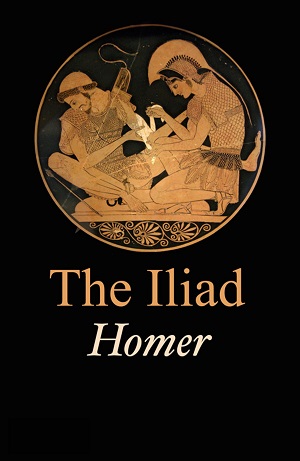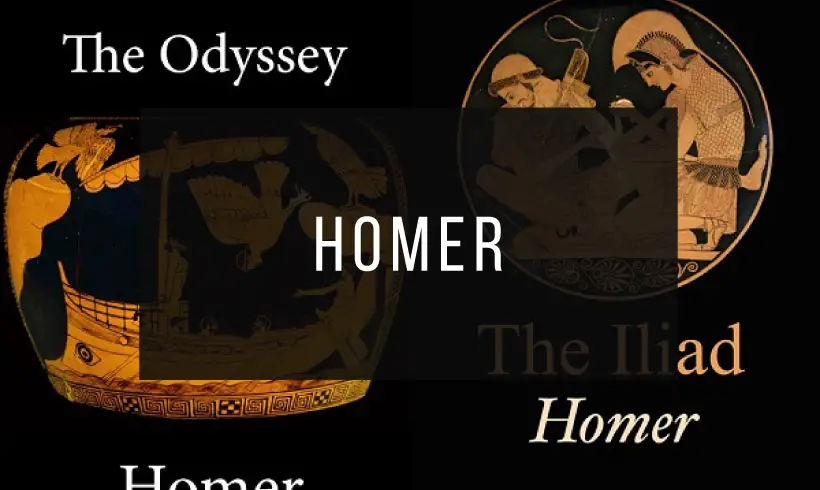The Greek poet Homer was born sometime between the 12th and 8th centuries BC, possibly somewhere on the coast of Asia Minor.
The Greek epic poet to whom the enduring epic stories of “The Iliad” and “The Odyssey” are attributed is an enigma as to the actual events of his life. Some scholars believe that he was a single man; others think that these iconic stories were created by a group. A variant of the group idea is that the storytelling was an oral tradition and Homer collected the stories and then recited them from memory.
Homer’s style, whoever he is, falls more into the category of a minstrel poet or balladeer, as opposed to a scholarly poet who is the product of a fervent literary moment, such as Virgil or Shakespeare. The stories have repetitive elements, almost like a chorus or refrain, suggesting a musical element.
However, Homer’s works are designated as epic rather than lyric poetry, originally recited with a lyre in hand, in the same vein as oral performances.
There is much speculation about Homer’s date of birth due to the paucity of actual information about him. His date of birth is assumed to be between 750 BC and 1200 BC. But others believe that the poetic style of his work indicates a much later period. The Greek historian Herodotus (c. 484-425 BC), often called the father of history, placed Homer several centuries before him, around 850 BC.
The exact place of Homer’s birth cannot be pinpointed, although that does not prevent scholars from attempting to do so. It has been identified as Ionia, Smyrna or, at any rate, on the coast of Asia Minor or on the island of Chios. But seven cities claim Homer as their native son.
However, some of these claims have some basis. The dialect in which “The Iliad” and “The Odyssey” are written is considered to be Asiatic Greek, specifically Ionian. That fact, together with frequent mentions of local phenomena such as strong winds blowing from the northwest towards Thrace, suggests, according to scholars, a familiarity with that region that could only mean that Homer came from there.
The dialect helps to shorten its lifespan by coinciding with the development and use of the language in general, but “The Iliad” and “The Odyssey” were so popular that this particular dialect became the standard for much Greek literature in the future.
Virtually every biographical aspect attributed to Homer derives entirely from his poems. Homer is believed to have been blind, based solely on a character in “The Odyssey”, a blind poet/ minstrel named Demodocus. A lengthy disquisition on how Demodocus was received at a meeting and entertained the audience with music and epic stories of conflict and heroes that received much praise has been interpreted as a clue from Homer as to what his own life was like. As a result, many busts and statues have been sculpted of Homer with thick, curly hair, beard and blind eyes.
“Plato recounts that in his time many believed Homer to be the educator of all Greece. Since then, Homer’s influence has spread far beyond the borders of Hellas [Greece]…”.Werner Jaeger wrote in Paideia: The Ideals of Greek Culture. He was right. The Iliad and the Odyssey have provided not only seeds, but also fertilizer for almost all the other arts and sciences of Western culture. For the Greeks, Homer was the godfather of their national culture, narrating their mythology and collective memory in rich, rhythmic narratives that have permeated the collective imagination.
1) The Odyssey

The Odyssey is a Greek epic poem composed of 24 books, attributed to the Greek poet Homer.
It is believed to have been composed in the eighth century BC in the settlements that Greece had on the west coast of Asia Minor (present-day Asian Turkey). According to other authors, The Odyssey was completed in the 7th century BC from poems that only described parts of the actual work.
It was originally written in what has been called the Homeric dialect. It narrates the return home from the Trojan War of the Greek hero Odysseus. In addition to having been away fighting for ten years, Odysseus takes another ten years to return to the island of Ithaca, of which he was king, during which time his son Telemachus and his wife Penelope have to tolerate in their palace the suitors who pretend to marry her (since they already believed Odysseus to be dead), while they consume the family possessions.
2) The Iliad

The Iliad is a Greek epic, traditionally attributed to Homer. Composed in dactylic hexameters, it consists of 15693 verses (divided by the editors, already in antiquity, into 24 books or rhapsodies) and its plot is based on the wrath of Achilles.
It narrates the events that took place during 51 days in the tenth and last year of the Trojan War. The title of the work derives from the Greek name for Troy, Ilium.
Both The Iliad and The Odyssey were considered by the Greeks of classical times and by later generations to be the most important compositions of ancient Greek literature and were used as the basis of Greek pedagogy. Both are part of a larger series of epic poems of different authors and lengths called the Epic Cycle; however, only fragments of the other poems have survived.







































